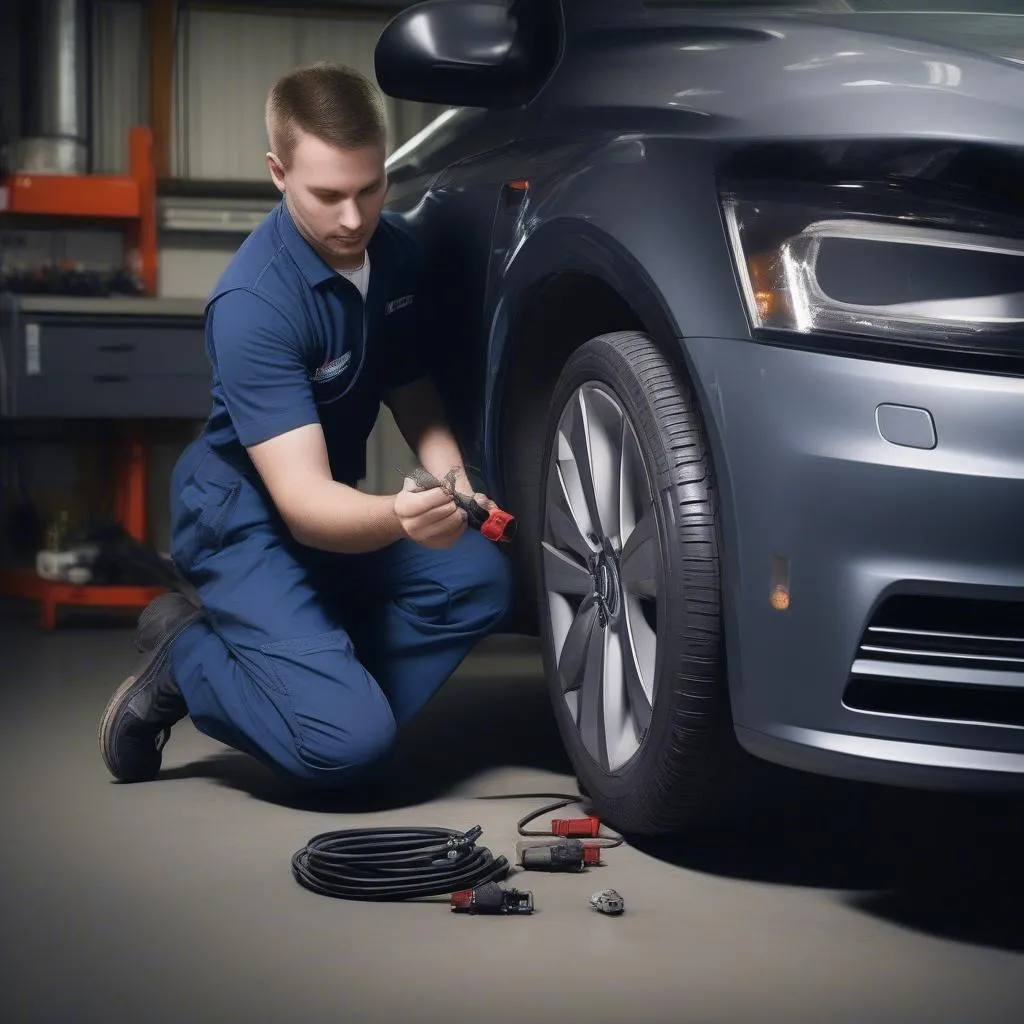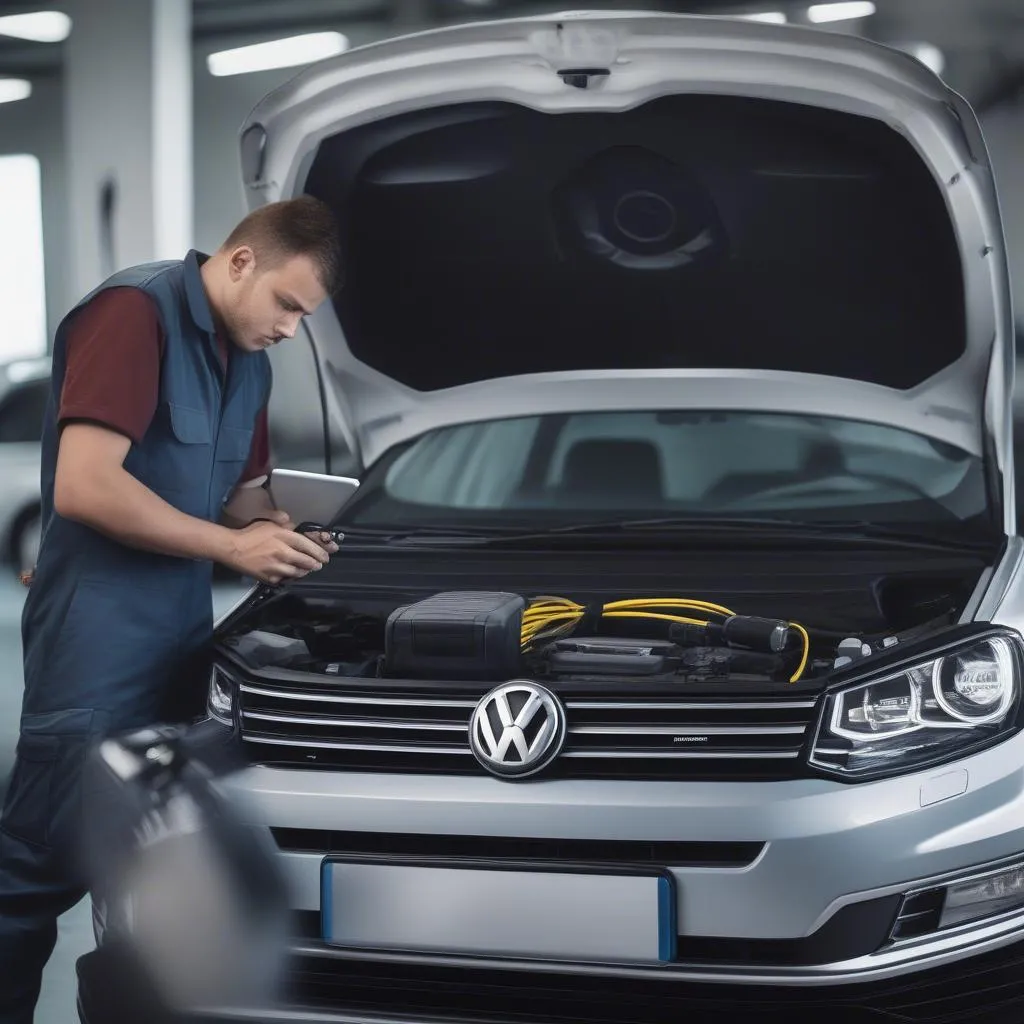Imagine this: you’re driving down the road, enjoying the smooth ride in your Volkswagen, when suddenly, the ABS light on your dashboard illuminates like a beacon. You might feel a jolt of anxiety – what does it mean, and what should you do? Don’t panic! This article will guide you through everything you need to know about VW ABS light, from its causes to potential fixes, and what to do when it’s on.
Understanding the VW ABS Light
The ABS (Anti-lock Braking System) is a safety feature designed to prevent your wheels from locking up during emergency braking, maintaining vehicle control and preventing skidding. The ABS light acts as a signal, alerting you to a potential issue within the ABS system.
Why is my VW ABS Light on?
There are several reasons why your VW ABS light might be on. It could signal a variety of problems, ranging from a minor sensor issue to a more serious mechanical fault. Here are some of the most common causes:
- Faulty Wheel Speed Sensor: These sensors are responsible for measuring the speed of each wheel, transmitting that information to the ABS control module. If one of these sensors malfunctions, the ABS light will illuminate.
- Damaged ABS Control Module: The ABS control module is the brain of your ABS system. If it malfunctions, it can prevent the system from working properly.
- Low Brake Fluid Level: Low brake fluid can affect the overall functioning of the ABS system, as it relies on hydraulic pressure to operate.
- Faulty Wiring or Connectors: Damaged wiring or loose connectors can disrupt the communication between various components of the ABS system.
- Electrical Short Circuit: An electrical short circuit within the ABS system can trigger the ABS light.
- Contaminated ABS Hydraulic Unit: Over time, dirt and debris can accumulate in the ABS hydraulic unit, affecting its operation.
- Air in the ABS Lines: Air bubbles in the ABS lines can interfere with the hydraulic pressure needed for the system to function correctly.
What to Do When Your VW ABS Light is On?
If your VW ABS light comes on, it’s important to take action. Here’s what you should do:
- Check your brake fluid level: As mentioned before, low brake fluid can affect the ABS system. Top up your brake fluid if necessary.
- Inspect your brake pads and rotors: Make sure your brake pads and rotors are in good condition. Worn or damaged brake pads or rotors can affect the ABS system’s ability to operate correctly.
- Have your car diagnosed by a qualified mechanic: It’s always best to have your vehicle diagnosed by a qualified technician, especially if the ABS light is accompanied by other symptoms, such as a grinding noise or a feeling of vibration in the brakes.
Troubleshooting Tips:
While diagnosing ABS issues can be complex, here are some basic troubleshooting tips:
- Check for loose or damaged wiring: Inspect the wiring harness and connectors associated with the ABS system for any signs of damage or loose connections.
- Test the wheel speed sensors: A qualified mechanic can test the wheel speed sensors using a scan tool.
- Inspect the ABS control module: This may require a more in-depth inspection by a trained technician.
Frequently Asked Questions:
Q: Can I safely drive my VW with the ABS light on?
A: While you may be able to drive your car with the ABS light on for a short period, it’s not recommended. If the ABS system is not functioning properly, your braking capabilities will be compromised, putting you and others at risk.
Q: How much does it cost to fix an ABS light?
A: The cost to fix an ABS light can vary widely depending on the cause of the issue. A simple sensor replacement might cost a few hundred dollars, while a more complex repair, such as a damaged ABS control module, could cost significantly more.
Q: Can I reset the ABS light myself?
A: It’s not recommended to try to reset the ABS light yourself. The ABS system is complex, and attempting to reset it without proper knowledge could potentially damage it.
Staying Safe:
A working ABS system is crucial for safe driving. Always listen to the warnings provided by your vehicle, and don’t ignore the ABS light. Consult with a qualified mechanic to diagnose and repair any issues as soon as possible.
Need Help?
If you need assistance with diagnosing or repairing your VW ABS light, feel free to reach out to us at Diag XCar. We offer expert diagnostics and repair services for European vehicles, utilizing the latest technology and tools. Get in touch with our team via Whatsapp: +84767531508. We’re here to help you get back on the road safely and confidently.
 vw abs light
vw abs light
 abs sensor
abs sensor
 diagnostic tool
diagnostic tool
Looking for More Information?
Want to learn more about ABS systems and how they work? Check out these articles on our website:
- How to Bleed an ABS Module with a Scan Tool
- VW Diagnostic Software
- How to Bleed the ABS Module Without Scan Tool
- VW ODIS Software
- Audi VW OBDeleven Pro Scan Tool
Let us know in the comments if you have any further questions about your VW ABS light. We’re always happy to help!